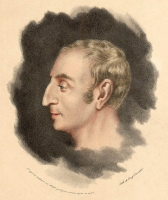| Claude Henri de Rouvroy, comte de Saint-Simon | |
| 克劳德·昂列·圣西门 | |
| | |
克劳德·昂列·圣西门(Claude Henri de Rouvroy, comte de Saint-Simon,常简称为Henri de Saint-Simon ,1760年10月17日 - 1825年5月19日)是法国哲学家、经济学家、空想社会主义者。与实证主义创始人奥古斯特·孔德相熟,曾聘其为秘书。
圣西门出身贵族,曾参加法国大革命,还参加过北美独立战争。他抨击资本主义社会,致力于设计一种新的社会制度,并花掉了他的全部家产。在他所设想的社会中,人人劳动,没有不劳而获,没有剥削、没有压迫。
出处
- ^ Horowitz, Irving Louis, Veblen's Century: A Collective Portrait (2002), p142
Claude Henri de Rouvroy, comte de Saint-Simon, often referred to as Henri de Saint-Simon (French: [ɑ̃ʁi də sɛ̃ simɔ̃]; 17 October 1760 – 19 May 1825), was a French political, economic and socialist theorist and businessman whose thought had a substantial influence on politics, economics, sociology and the philosophy of science.
Saint-Simon created a political and economic ideology known as Saint-Simonianism that claimed that the needs of an industrial class, which he also referred to as the working class, needed to be recognized and fulfilled to have an effective society and an efficient economy. Unlike conceptions within industrializing societies of a working class being manual labourers alone, Saint-Simon's late-18th century conception of this class included all people engaged in productive work that contributed to society such as businesspeople, managers, scientists and bankers, along with manual labourers, amongst others.
Saint-Simon said the primary threat to the needs of the industrial class was another class he referred to as the idling class, that included able people who preferred to be parasitic and benefit from the work of others while seeking to avoid doing work. Saint-Simon stressed the need for recognition of the merit of the individual and the need for hierarchy of merit in society and in the economy such as society having hierarchical merit-based organizations of managers and scientists to be the decision-makers in government. Saint-Simon strongly criticized any expansion of government intervention into the economy beyond ensuring no hindrances to productive work and reducing idleness in society, regarding intervention beyond these as too intrusive.
Saint Simon's conceptual recognition of broad socio-economic contribution, and his Enlightenment valorization of scientific knowledge, soon inspired and influenced utopian socialism, liberal political theorist John Stuart Mill, anarchism through its founder Pierre-Joseph Proudhon who was inspired by Saint-Simon's thought and Marxism with Karl Marx and Friedrich Engels identifying Saint-Simon as an inspiration to their ideas and classifying him among the utopian socialists. Saint-Simon's views also influenced 20th century sociologist and economist Thorstein Veblen, including Veblen's creation of institutional economics that has included prominent economists as adherents.
